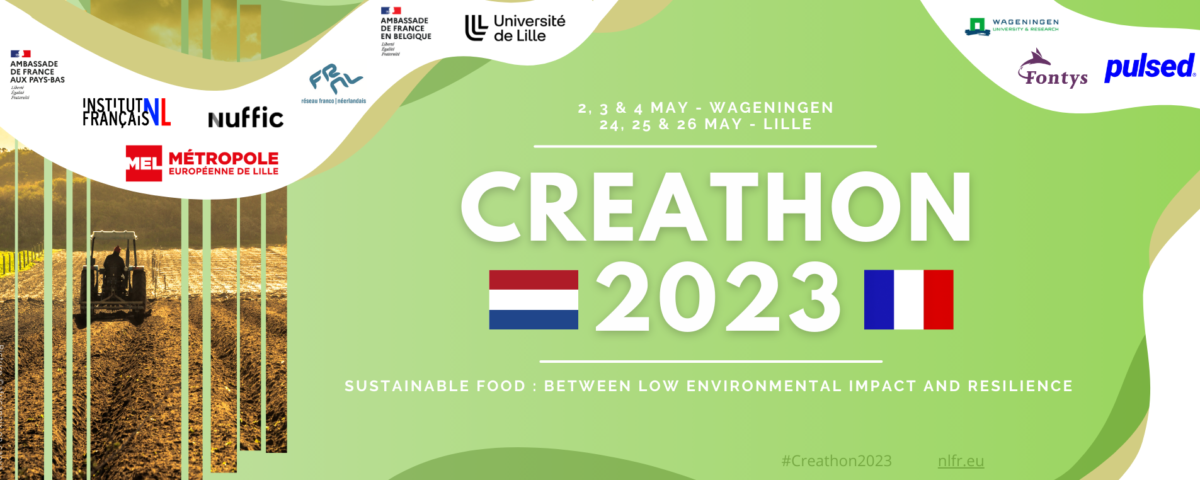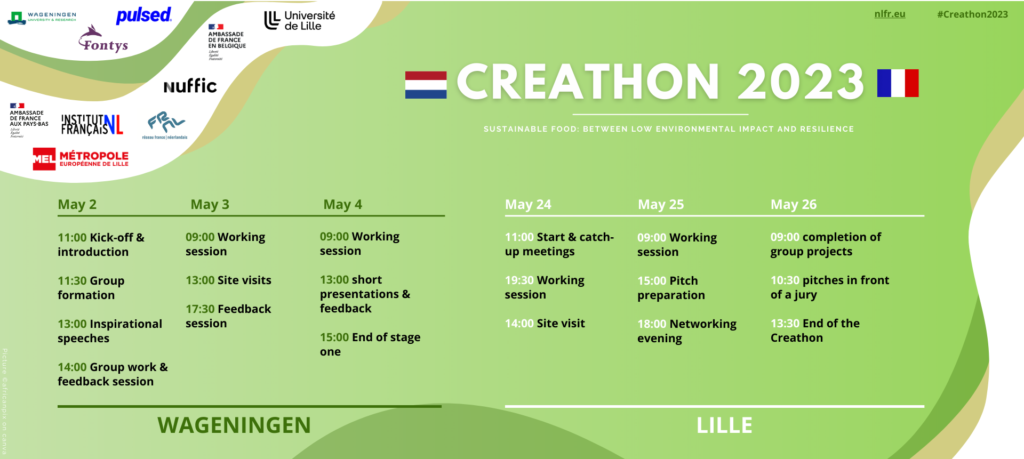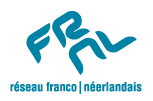Cross-Creathon 2023 : Call for applications

Pour la version français, cliquez ici / Voor de Nederlandse versie, klik hier.
« Sustainable food : between low environmental impact and resilience »
Are you a Bachelor/Master/PDEng/PhD student or a young professional working or studying in the region of Lille, Belgium and the Netherlands? Do you have creative ideas on how to make the current food system more sustainable and resilient thanks to innovation and improvements ? Are you creative and/or entrepreneurial?
Then this might be your opportunity to participate in our Cross-Creathon 2023 on “Sustainable food : between low environmental impact and resilience ». Scroll down to fill in the application form and send it in with your CV before February 14, 23:59 (the deadline has been pushed form the 5th to the 14th).

What is a creathon?
Creathons are ‘creative marathons’ and are best described as interactive workshops that bring together talented students and young professionals. Participants come from different personal, professional and educational backgrounds and work together to deliver innovative solutions, projects or prototypes related to a pre-formulated topic. Find here an explanation sheet.
Click here for more information about our previous creathons.

Context of the Cross-Creathon 2023
France, Belgium and the Netherlands share a common goal that is to work towards carbon neutrality. In that sense, France and the Netherlands have issued a Joint Communiqué on March, 9th 2022, following the Joint Declaration of 31 August 2021, regarding their goals for the coming years. Both countries have reiterate their commitment to the EU’s climate and energy targets, which call for at least a 55% reduction in emissions by 2030 and carbon neutrality by 2050.
In France, and more specifically in the North of France, the ambition of the European Metropolis of Lille (MEL) follows the national and European motivation. One of it’s objectives is to act for the climate and its citizens through supporting the development of environmentally friendly agriculture and short-distance supply. They aim to strengthen agriculture as an economic sector, to encourage sustainable agricultural practices, to structure the supply of local products and to preserve agricultural land. The MEL works to develop sustainable agricultural techniques and practices by investing in innovation, in technology and implementing a territorial food project (PAT) that aims to bring together producers, processors, distributors, local authorities and consumers.
Belgium, and more specifically Fevia, the Belgian Food Industry Federation, as issued a Sustainability roadmap for the Belgian food industry in November 2021. One of it’s main objectives focuses on ‘Climate, sustainability and innovation’ that aims to accelerate the transition to a decarbonised, sustainable and climate-resilient economy, reinforcing the national energy and climate plan for a transition towards climate neutrality. Part of the axis concerns research and development to support energy transition and further limit CO2 emissions. It also aims to restore biodiversity and strengthen adaptability and resilience to climate change
In order to reduce greenhouse gas emissions, the Netherlands aims to take action in a number of sectors, including agriculture & land use where the focus is put on for example climate-friendly food consumption, reduction of food waste or carbon storage in soil and vegetation through pilot programmes for climate-friendly land use.
The Netherlands work to transition towards a more circular and sustainable agriculture and food production in order to minimise its impact on the environment. Some of the main objectives are to lower the energy and resources consumption, the usage of raw materials and to put an end to wastage that occurs in various parts of the food chain. In order to do so, multiple actions and policies are put in place such as the Dutch Common Agricultural Policy (CAP), set to start on 1 January 2023. Recently approved by the European Commission, the CAP is designed to shape the transition to a sustainable, resilient and modern European agricultural sector. Under the reformed policy in the Netherlands, funding will be more fairly distributed among farms, with an emphasis on small- and medium-sized farms, as well as young farmers. Moreover, farmers will be supported to take up innovation, from precision farming to agro-ecological production methods.

A trinational in-person event
The Creathon is divided in two stages. The first part consists of preparatory sessions at different inspiring locations in Wageningen on May 2, 3 and 4. Approximately one month later, the second stage and final sessions will be held in Lille on May 24, 25 and 26. All 32 selected participants (FR, NL, BE) will have to attend both stages.
Coached by three experts – from the MEL, the Netherlands and Belgium -, you will work in mixed teams in terms of disciplines, level of study, territory and gender.
- During the first stage in Wageningen, small groups are formed in order to work collectively on one of the challenges pre-formulated by the organisers, the coaches, and their partners. At the end of the first stage, each team will present their project proposals to the other teams, the coaches, the organizers and to local partners to collect valuable feedback.
- During the second stage in Lille, the focus will lie on finishing and fine-tuning the projects based on the received feedback. At the end of the programme, all groups will present their final work in front of a jury of experts. During their final presentation, all teams will expose how to implement their idea with for instance a prototype, an infographic, a basic business plan or a visual presentation. The winning team members receive financial aid in the form of a mobility grant, in order to help further develop the group project.
The programme of both stages include inspirational talks by several experts, site visits, collective working sessions and networking events were it will be possible to meet stakeholders, companies, local experts, etc.
Please notice that the development of a project requires that between both parts, you keep on working (alongside your other activities and in a flexible manner) on your group projects. Exact time management and investment is decided upon by the team themselves. To help you in this process, an online meeting with the coaches might be scheduled so that you can discuss your achievements during this period.

Practical information
- Organisers: The Cross-Creathon 2023 is organised by The Lille European Metropolis (MEL), the French-Dutch Network for research and higher education (RFN), the Institut français NL and Nuffic, which is the Dutch organisation for internationalisation of education.
- Partners: Wageningen University & Research, Fontys Pulsed and the University of Lille and the French embassy in Belgium.
- When and where: In Wageningen (May 2, 3 and 4) and in Lille (May 24, 25 and 26), both in-person events provided that the health regulations in both countries allow it.
- For whom: Bachelor/master/PDEng/PhD students and young professionals aged 18-35 and residing in Lille, Belgium or the Netherlands are eligible; international students are also welcome.
- Language: The working sessions will be in English.
- Costs: The organisers will cover the costs of transportation (travel between France, Belgium and the Netherlands and vice versa + public transport/biking (if possible) on-site), accommodation (two or three nights in a hotel for non-Lille residents and three nights in a hotel in the Neherlands for non residents of Wageningen) and meals (breakfast, lunch and dinner for both stages of the programme). You are responsible for the costs of any other expenses yourselves.
- Participation: All 32 selected participants will attend both stages in both countries. Participation in the full programme is mandatory. Any unjustified failure (absenteeism, inappropriate behaviour) will lead to exclusion from further participation in the Creathon.
- Jury: The organisers will choose a panel with members from different professional backgrounds (higher education and research, business and the culture sector). The jury is sovereign in its deliberations and designates the winning team. The jury will meet on May 26 in Lille to assess the presentations. The teams will present their respective projects in the form of a 5-10 minute pitch in front of the jury and other attendees.
Project proposals will be evaluated on the following criteria and topics:
* Relevance * Originality-creativity
* Impact * Coherence
* Feasibility * Concreteness
* Scalability * Team spirit
The names and affiliations of the winning team will be publicly announced at the end of the jury’s deliberations. An online article will showcase all the proposals and will include photos taken during the sessions and the final ceremony in Lille.
Tentative programme :

